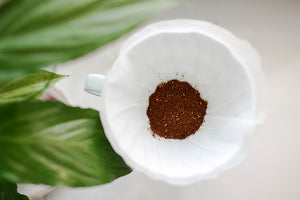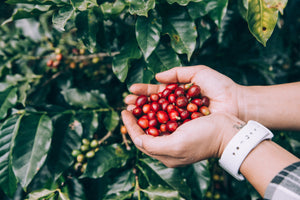
How to be an eco-friendly coffee lover
You’re a certified coffee nerd, right? But you also want to do what’s right for the planet too. The world of coffee is a minefield of jargon, messy supply chains and every company making claims on the ‘most sustainable way to drink coffee.’ So as a conscientious consumer, how can you drown out the considerable noise and be sure you’re treading the right path?
Well, the first stepping stone is right here. Read on for tips and guidance on making sure your daily brew has a minimal impact on the environment. Recent research indicates that most of the impact the coffee industry has as a whole, actually stems from coffee consumption, rather than production. So we, as coffee drinkers have a very important responsibility for making informed choices to limit the impact we have.
1) Reduce energy used for brewing
The biggest source of carbon emissions from cafés actually comes from the electricity used to heat water and brew coffee. As a home-drinker you have ultimate control over how much energy goes into making your coffee so some easy ways to have a positive impact is to….just use less.
- Only heat as much water as you’re actually going to use.
- Turn off machines that are not in use.
- Use a thermal server or coffee cup to avoid using your machine’s hot plate.
- Consider lower impact brewing methods such as a manual pourover or aeropress.
The ultimate energy-saving way to enjoy your coffee is to make the switch to cold brew. Read our guide here (LINK) to find out why cold brew is so eco-friendly and how to make the perfect cold brew coffee at home.
2) Reduce your dairy consumption
The dairy industry creates a high level of carbon and methane emissions. On top of this, if you’re ordering a cappuccino or latte to go; takeaway cups are much larger than ceramic ‘drink in’ cups, needing more energy-use and milk to fill them, not mention the impact of that single-use cup.
The solution? Consider switching large, milky drinks for something smaller like a flat white or piccolo. While dairy-free milks are a contentious topic when it comes to environmental impact, oat milk is proven to beat dairy in terms of emissions, land and water use so is a viable swap to reduce your coffee habit’s eco-impact.
3) Carry a reusable coffee cup
We all know it by now; single use coffee cups are not the ideal way to enjoy your coffee. Not only do the thin walls make for a cold coffee within minutes, 2.5 billion of them per year are used once and sent straight to landfill in the UK.
The BBC estimated in 2018 that 99.75% of recyclable single-use coffee cups were actually recycled due to a combined shortage of companies able to process them, and consumers’ lack of effort in getting them there. Most coffee cups are disposed of into bins that head straight for landfill, so was it worth the effort to make a recyclable cup in the first place? Probably not.
The single, most effective way to make sure none of those coffee cups in landfill have your name on them is simply not to use them. Carry a reusable coffee cup
with you and – voila – no more waste!
4) Recycle your coffee packaging
At Best Coffee we generally stock coffees that are packaged in recyclable materials, including our coffee pods. It’s best to check each brand specifically to see whether they can be placed in your usual recycling bin or need a special effort. In any event, companies like Terracycle and FirstMile can help conscientious coffee lovers to get their bags to the right place for recycling.
5) Choose specialty coffee
Buying Fairtrade, Rainforest Alliance or UTZ certified coffees is a good first step on the road to more environmentally friendly coffee sourcing. To go one step further look into the ranks of specialty coffee producers who produce higher quality coffee, scoring 80+ on the coffee review scale.
As a rule, the work and farm practises that are required to produce specialty-grade coffee will also result in better care for the local environment. Encouraging biodiversity, natural pest control, circular water and waste management are just some of the practises more likely to be found on specialty farms. In short, it’s well worth paying extra for specialty coffee; a better tasting product and better outcomes for the native wildlife & environment.
6) Re-use coffee grounds
Coffee grounds are a waste product with no further value or application, right? Think again, eco-warrior! Used coffee grounds can be used in whole range of meaningful ways, giving life to something you were just going to throw in the bin.
- Making compost
- Deterring garden pests naturally
- Marinating meat
- Making cosmetics and scrubs
These are just a few creative ways to give a second life to your coffee grounds – a simple internet search should give you loads of inspiration.





